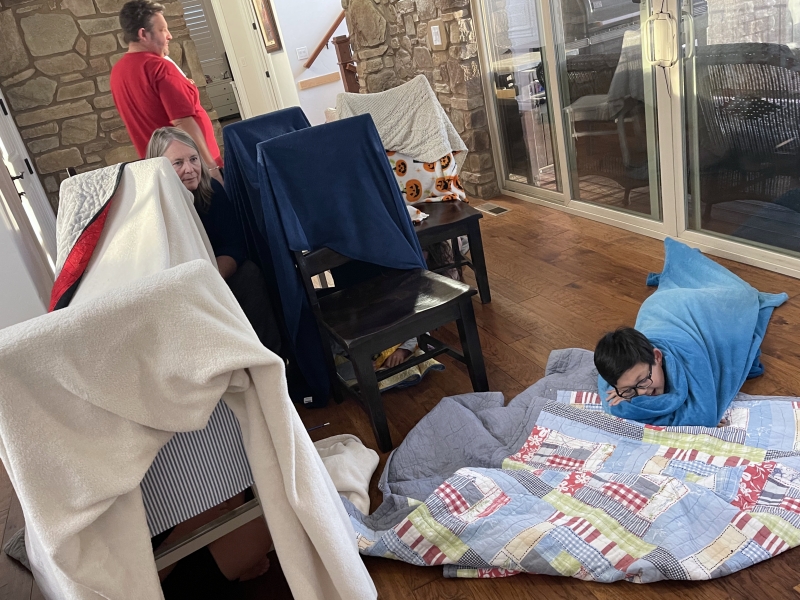Ephesians #6 "You'll Never Be Fully You..."
October 15, 2023Pastor Patrick presented this morning's message, "You'll Never Be Fully You...." It was the 6th message in a series studying the book of Ephesians. A video of the message is here. Our Conversation Starter for this week is here.
Pastor Patrick's last thoughts in this message had to do with spiritual gifts. Do you recognize them in yourself? Are you using them? What are your gifts? And the like.
Of course, my thoughts went immediately to questions like, "Are these gifts mentioned in the Old Testament? If so, what were they?" As it turned out, I found a fascinating article on the topic by Art Lindsley. Read it here.
Here are some takeaways I found most interesting:
In Creation, we were all given "natural" gifts. The work of the Spirit is already mentioned in Genesis 1:2, "and the Spirit of God was hovering over the waters."
We often think of these gifts as "Gifts of the Spirit," or "Spiritual Gifts." The Hebrew word for spirit can also mean breath or wind. In all cases, the reference implies power. The Spirit empowers us to use our gifts effectively to build the Kingdom.
In the Old Testament, the phrase "came upon" is often used, as in, "the power came upon him." The phrase in Hebrew also means "clothed." I like the image of "wrapped up in" a gift.
Lindsley suggests that being "born again" in the New Testament has an element of renewing or re-discovering gifts we've had since we were born (created).
One of the first OT references to God granting gifts is in Genesis 31:1-11 where God provides artistic gifts to Bezalel, Oholiab, and others in order to properly follow His instructions about building the tent of meeting and the ark of the covenant.
To summarize Lindsley's summary:
- Gifts include power to use them
- Natural and spiritual gifts are both of the Spirit
- Both OT and NT gifts require the Holy Spirit
- OT gifts were often for leadership to judges
- OT gifts were artistic (see above)
- God gave prophets the ability to speak persuasively
- OT gifts included political leadership
Bonus
What to Make of the Middle East
Here are two 5-minute videos at PragerU that might help clarify the "big picture" in the Middles East:
Israel: Who Are the Indigenous People?
The Middle East Problem
Bonus 2
 Sukkot - Festival of Booths
Sukkot - Festival of BoothsRecently, the Jewish community celebrated three major holidays. Rosh Hashanah - the Jewish New Year, followed by Yom Kippur - the Day of Atonement, and lastly, Sukkot - the Festival of Booths and/or the Harvest Festival.
Sukkot is described in Exodus 34:22 and in Leviticus 23:42–43 (and elsewhere). The latter text reads: "You shall live in booths for seven days; all that are citizens in Israel shall live in booths, so that your generations may know that I made the people of Israel live in booths when I brought them out of the land of Egypt: I am the Lord your God."
Observant Jews will build outdoor "booths" (sukkhas) in their back yards and eat meals in them and even sleep in them during the week of the celebration. Remember, ritual is the physical representation of something to be remembered, much like Communion is for Christians.
This holiday is also called Feast of Tabernacles. The Tabernacle is where God first "dwelt among his people." When Jesus came, He dwelt among his people, in the same sense.
As part of our weekly Family Dinner, we built "booths" in the dining room (see photo) after having shared a brief description of the holiday. If you didn't catch it, the key take away is to remind us what the Israelites lived like while they were in the wilderness and how God miraculously took care of them (e.g. with manna).
So, what did we do in our booths? We all took a portion of the U.S. citizenship test. You know, the kind of test immigrants must pass to become a U.S. citizen. We're going to have to work on our American history and basic knowledge...
And just to cap off our little holiday info here... The eighth day of Sukkot is called Shemini Atzeret (which means "Eighth [Day] Stop") is found in Leviticus 23:36. It symbolizes Israel's unique relationship with God, "stop" and appreciate it. In Israel, this day is also Simchat Torah, a celebration of completing the annual cycle of reading through the Torah (one part, called a parshah, is read each week) and beginning the cycle anew. I had my own little Simchat Torah both times I completed the 250 hours of Prager's verse-by-verse Torah course.